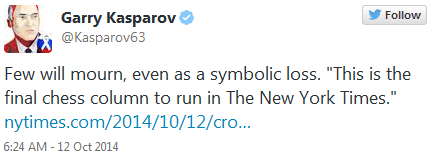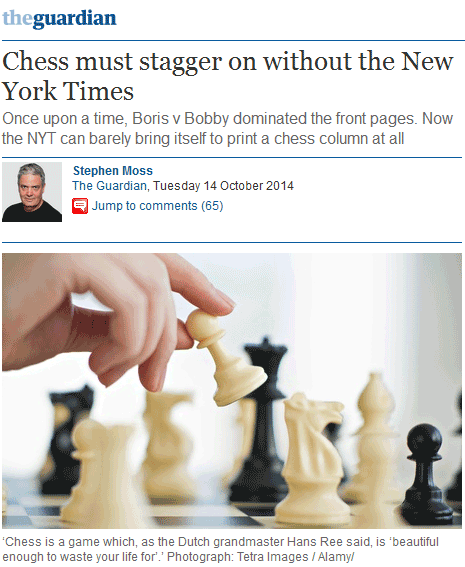
On October 11 the chess column of the New York Times, headlined "After Rocky Start, Grand Prix Finds a Favorite in the Lead", by their chess columnist of many years, Dylan Loeb McClain, ended with an ominous sentence:

This sent minor shock waves through the chess world, but Slate Magazine tells us that the Times’ decision to kill the chess column isn’t quite final. “We are considering eliminating the chess column in order to keep freelance costs in line,” Times spokeswoman Danielle Rhoades Ha told Poynter’s Andrew Beaujon. “A final decision for the column (on all platforms) has not been made yet.”
Garry Kasparov greeted the news of the demise of the NYT chess column with the following tweet:

Matt Gaffney of Slate agrees with Kasparov:
As a format, the weekly newspaper chess column is archaic, yet another in the infinitely long list of things rendered obsolete by the Internet. Weekly newspaper columns were cherished sources of hard news for America’s chess fans in pre-Web days... Fast-forward to the present day, where every major tournament is livestreamed—yes, with webcams on the boards and players—and anyone with a laptop can access more information, photos, videos, data, and opinions on the chess world than could possibly be digested. That 1970s or ’80s tournament that thousands of American chess fans would learn about 10 days later from a Times column is now available live, for free, to anyone who cares to watch, with analysis and comments by endless grandmasters in multiple languages. For instance, most of McClain’s last Times column focuses on Fabiano Caruana’s game with Peter Svidler at the Baku tournament. But you can find annotations by a grandmaster, who is a much higher-rated player than McClain, along with seven professional-quality photographs, at the site ChessBase. And that article was published several days before the Times column.
So are chess columns in the broadsheets dead? Not quite, says Gaffney, and speculates what a relevant, interesting weekly chess column could look like in 2014? He lists three essential characteristics:
- It must be written by someone who is deeply involved in the chess world.
- They have to be world-class players, either past or present. Most likely past, since you won’t find too many active top players willing to spend playing and preparation time writing a weekly column for a general audience.
- The person needs to be an engaging writer, highly opinionated, and preferably a bit of a character.
For the New York Times chess column that would mean: Go big, or go home. Either shutter it altogether, or hire one of the two best English-speaking chess columnists and have the best chess commentary in the world. Those two candidates, who fit the above criteria precisely, are:
 |
Lubomir Kavalek: A 71-year-old Czechoslovakia-born U.S. grandmaster and a world-class player in the 1960s and 1970s, Kavalek wrote a dazzling column for the Washington Post from 1986 to 2010. After he was dropped by the Washington Post, Kavalek’s column went to the Huffington Post, where it has resided since. Kavalek’s columns sparkle with unexpected and fascinating dives into chess history—history that he both witnessed and made. |
 |
Nigel Short: The puckish and often controversial 49-year-old English grandmaster was the No. 3 player in the world in the late 1980s. He’s part of chess history for several reasons, the main one being that he was Garry Kasparov’s challenger for the world championship in 1993. He’s also an enormously entertaining writer who crafted a much-loved weekly column for the Sunday Telegraph for a decade, but has been without such a perch since 2006. |
Gaffney thinks the Kavalek and Short columns are everything that the Times’ chess writing hasn’t been in recent years: fun, dishy, and full of information that you can’t find elsewhere. "So, those are your choices, New York Times," he writes. "Hire Kavalek or Short, or nix the weekly chess column altogether. Your move."
We would like to mention that ChessBase has had a very productive relationship with the Huffington Post and Lubomir Kavalek. We helped to set up their JavaScript replay board that allows readers to play through every move Kavalek mentions in his text. In return we have been republishing the column on our news page. Yesterday Kavalek and Frederic Friedel celebrated the 100th article of their cooperation with a glass of red wine and a toast. The fact that they were many thousands of miles apart did not make a big difference in the Internet age.

We have just seen another highly readable article on the subject, this one in The Guardian. Stephen Moss thinks that this is a sign of the times: chess is dying as a mainstream pursuit. "Happily, the Guardian still publishes a chess column (written by Leonard Barden, who will next year clock up an incredible 60 years as a contributor to the paper). The reasons for chess's fall from grace," says Moss, "are numerous – the loss of the cold war narrative, the mystique of the all-seeing grandmaster being stripped away by the even more all-seeing computer program, changing work patterns and rival leisure pursuits killing off clubs."





























